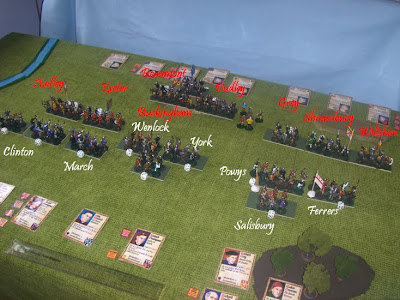The day of battle dawns, and the two armies line up. The Yorkists have York himself in the Centre, his son the Earl of March on the left, and Salisbury on the right. Facing them are the Lancastrians with Buckingham heading the centre, while Exeter takes their right & Wiltshire the left. Wiltshire is an 'amateur' commander and also 'Timorous', so he's the likeliest to quit out if the going gets rough. Also, Buckingham has also prepared a feint to lure in the impulsive York - how will it all turn out? Let's see, through my pics of the game (which I've also added some handy name-markers to!)
The Setup (Yorkists in white lettering, Lancastrians in red.)
The battle begins! Initially promising to have the wind behind the Lancastrians, the Yorkists get a bonus when the wind direction suddenly shifts in the opening moments and removes the disadvantage they had been facing.
"To Arms! A York!"
York in pride of place, surrounded by retainers.
"Buckingham for the king!"
The king's lines, just before they 'run away' back up the slope. Crafty old Buckingham!
The advance underway. The Yorkists advance, and Buckingham's ruse works like a charm. York loses his head and orders all his men to rush on, throwing his central battle into disorder. Meanwhile, Exeter on the Lancastrian right decides to charge onward to strike Edward of March down in short order.
Charge! Buckingham's view from the hill as his right surges forward under Exeter. It duly strikes poor Edward full-force and nearly knocks his company to pieces. The Yorkists take heavy losses, including the Lord Clinton. The whole ward buckles back and comes within an ace of breaking, but the tireless and inspiring Edward (even though he's in his late teens) manages to just barely hold out and stalls Exeter just short of breaking through.
The centres grow close, with total disorder reigning in York's ranks. They are thrown into disorder by archery, lose out in exchanges, and can only advance at a slow, stuttering pace. Still, at least it's not going totally Lancaster's way - Confused old Wiltshire orders the Lancastrian left to advance slightly, but then can't manage to stop it. It keeps on drifting further and further forward, away from Buckingham's flank and towards Salisbury's ward opposite.
Full-contact along the lines as the armies grapple from one end to another
Wiltshire vs Salisbury. The pair lock together with much bloodshed. The Yorkist Baron Powys is killed in the scrum, and only Salisbury hastily throwing in the reserve holds it together. Wiltshire may be a fool, but his men know how to fight!
Disaster in the centre! York finally strikes Buckingham's lines and comes off worst. York is himself cut down in the struggle - the great rebel himself, dead on the field! At this, Wenlock's company cracks and runs, threatening a wholesale collapse. The Yorkist cause is in crisis, and the day hangs in the balance.
On the Yorkist left, March continues to hold out (doubtless unaware his dad has just died in the centre). This proves to be all that is required however, as reinforcements finally rush to the scene and fling themselves onto the flanks of Exeter's ward. At this, the exhausted Lancastrians crack and flee. Lord Audley is captured in the rout and taken prisoner, and Exeter himself is killed by the anonymous swords of the commoners in the chaotic rout. The whole Lancastrian right wing has collapsed!
Battle's end (Routers' names are in brackets)
This proves the crisis for the Lancastrian cause also, but while the Yorkists merely faltered a little, the Lancastrians go all to pieces. The faint-hearted Wiltshire suddenly remembers something he must attend to elsewhere, and the Lancastrian left wing begins to withdraw. Doubtless Buckingham in the centre is cursing his unreliable noble!
The routers and withdrawers back away, and the state of play becomes clear. Shrewsbury is killed in the rout, Lord Dudley dies, while Lord Wenlock gets captured by the Lancastrians. The Yorkists have seven hugely battered companies left to square up against just two of Lancastrians. It looks bad, and shortly as the two exhausted armies face off against each other, the withdrawing Wiltshire convinces the Lancastrians to quit the field. York surges on against them in pursuit. From despair to triumph! What a narrow and glorious victory for York! Pity he's dead, and all that...
The hero of the day, Edward Plantagenet, Earl of March











